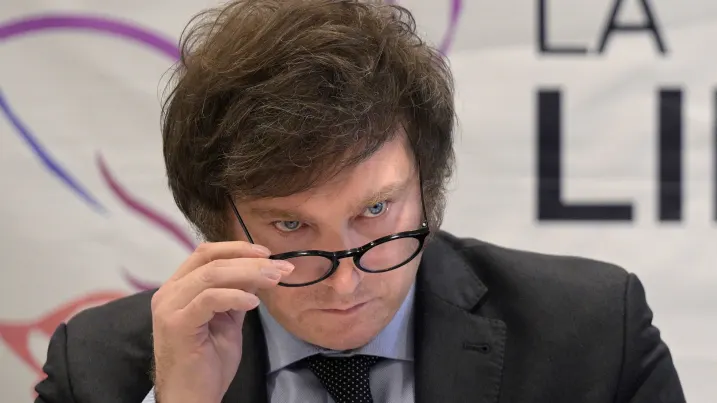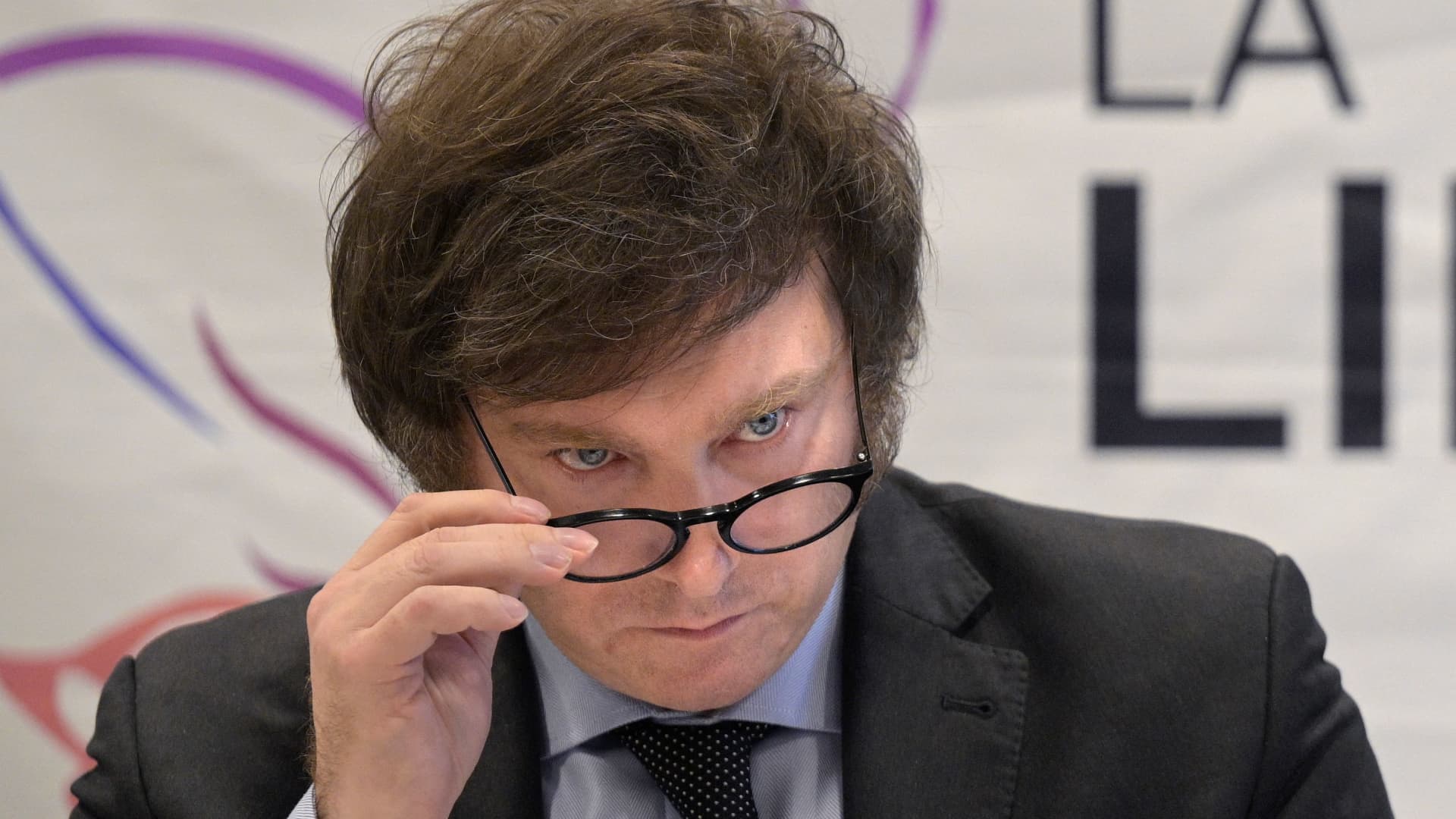In Country Where Houses Are Bought in $100 Bills, Plans for Sweeping Change
By
Jack Nicas, Natalie Alcoba and Lucía Cholakian Herrera, Reporting from Buenos Aires | Nov. 24, 2023
A shop in Buenos Aires, where prices are often written in chalk to allow for frequent increases
Marcelo Capobianco was inspecting the calf carcass he had just hung from a hook in his small butcher shop outside Buenos Aires on Tuesday when he admitted that the premium-grade beef would hardly earn him anything.
That’s because since his preferred candidate, Javier Milei, won Argentina’s presidency two days earlier, the cost of the meat had jumped by five percent, while the street value of the Argentine peso had fallen by 12 percent, hurting his customers’ purchasing power.
Mr. Capobianco said that he had already raised prices so many times in recent months, he was reluctant to again pass the costs on to customers. “It’s already proving difficult to sell at these prices,” he said.
Across his shop were signs of the spiraling economic crisis and 140 percent inflation that has convulsed Argentina and catapulted Mr. Milei, a self-described “anarcho-capitalist” libertarian who wants to replace the peso with the U.S. dollar, to Argentina’s highest office.
There was the wall of prices written in chalk to allow for frequent increases; the counter where every morning he livestreams that day’s prices to customers watching on Facebook; and the sandwich board he used to advertise a cut of beef in dollars recently, with Mr. Milei’s campaign slogan scrawled alongside it: “Long live freedom!”
It was a tongue-in-cheek demonstration, Mr. Capobianco said, that “we already live in a dollarized economy.”
Not yet.
Mr. Milei, 53, an economist and former television pundit, has made “dollarization” the centerpiece of his radical plan to save Argentina’s economy, which also includes closing the central bank and sharply reducing the size of government.
Still, after years of high inflation and a 93 percent nosedive in the value of the Argentine peso since the start of the pandemic three years ago, the already topsy-turvy Argentine economy has evolved to rely even more on U.S. dollars to function from day to day.
Argentines buy houses and cars with stacks of $100 bills. News sites keep a real-time tracker of the “blue dollar,” a black-market exchange rate for dollars that is technically illegal for Argentines to use, but that almost everyone does anyway.
And after Argentines convert their pesos to dollars, many hide them under floorboards, in old clothes or locked away in rented safe deposit boxes in underground vaults.
With their paychecks disintegrating in value the moment they get them, Argentines who can save money usually choose hard American cash.
As a result, about 10 percent of all U.S. currency in circulation is in Argentina,
according to some estimates, or roughly $200 billion, more than in any other country outside the United States. That’s an average of about $4,400 in cash for every Argentine, compared to $3,100 for every American.
The dollar has long been prominent in Argentina, with its movement against the peso serving as a benchmark for the country’s economic health for decades. It has also long been the preferred way to pay for big-ticket items. That includes the transfer of Diego Maradona, the country’s soccer superstar, to an Argentine club in 1981.
As a result, for many Argentines, the U.S. dollar has become a symbol of safety. So when Mr. Milei made it a symbol of his campaign, it turned out to be an effective political strategy.
At his rallies, dollars with his face on them would rain down and his supporters would pass him blown up $100 bills that he would hoist over his head like a trophy.
Now Mr. Milei is set to be sworn in as president next month, and he may soon find that his promises will be far more difficult to keep than to make.
Economists have warned that dollarizing the Argentine economy will be a challenge because doing so usually requires a country to have a large sum of dollars to begin with. And while many Argentines have dollars stuffed under mattresses, Argentina’s government basically has none.
“Dollarizing won’t be possible, at least immediately,” said Santiago Bulat, an Argentine economist. He also pointed out that other countries that have dollarized, including Ecuador and El Salvador, have still struggled to improve their economies.
“Ecuador dollarized, yes, in a very critical situation,” he added. “But now they depend on the United States’ monetary policies. They defaulted twice in 20 years.”
Economists said that using the dollar as an official currency strips countries of important monetary tools, such as interest rates, to try to control inflation or soften economic downturns. Some economists said that switching over to dollars also often forces countries to take a haircut on the value of their currency, leading to an effective pay cut for the nation’s workers.
On the campaign trail, Mr. Milei said that if an outside investor — he didn’t suggest any specific names — was willing to loan Argentina tens of billions of dollars, he could dollarize quickly. If not, he said it would be a matter of “financial engineering” and simply take longer.
The crisis has roots in years of the government’s economic mismanagement, including overspending, big deficits, protectionist trade policies, complicated currency controls, $44 billion in international debt and an overreliance on printing more pesos to pay the government’s bills.
Annual inflation has been in the triple digits for months, more than two-fifths of Argentines are poor, and hunger and homelessness are rising.
The government estimates that many workers have received on average a 92 percent raise over the past year — a figure that seems astonishing before taking into account that prices have risen even faster.
But half of Argentina’s work force is in the so-called informal economy — a list that includes Uber drivers, street vendors, nannies and freelance workers — and their wages have risen very little.
Jonathan Araya, 30, a supermarket worker in Buenos Aires, said he recently took on a second job as a waiter because his expenses have climbed so fast. Still, he tries to set aside money each month to buy $200 in American dollars — but the peso’s plunging value has made that more difficult.
In April 2020, at the start of the pandemic, $1 bought 80 pesos at the “blue dollar” rate. A year ago, $1 bought 300 pesos.
On Tuesday, as markets in Argentina opened for the first time since Mr. Milei’s victory, the peso’s value fell to a record low. That day, $1 bought 1,075 pesos.
“You’re constantly gathering up money quickly in order to buy dollars,” Mr. Araya said, “because the next day, it’s devalued again.”
Mr. Capobianco was in his butcher shop on Tuesday greeting customers he was seeing for the first time since the election.
“Did we vote well?” Mr. Capobianco, 53, said to one of his regulars, Isabel Michelitsch, 75.
“We voted well,” she answered, pulling out a horn in the blue and white colors of the Argentine flag that she used to celebrate Mr. Mieli’s victory.
Ms. Michelitsch said Argentina’s economic morass had made her the “minister of economics” of her household, leaving her constantly on the lookout for a deal. She was carrying three large corn cobs she had bought for 1,000 pesos, or less than $1, at a store around the corner.
Mr. Capobianco said his business’s struggles had been driven by the weak peso. A drought across much of Argentina had destroyed the pasture that usually fed the animals that supply his shop, so producers were instead using animal feed, which is priced in dollars.
“Automatically that makes the product more expensive,” he said, “and that’s what you then pass on to the people.”
The truck that brings him many of his products also broke down, and the replacement parts were priced in dollars, which is a cost his supplier will pass on to him.
“It’s been a pretty traumatic situation,” said Mr. Capobianco, adding that he nearly closed his shop this year. But now, with Mr. Milei about to assume power, he is hopeful that a solution is coming, even if getting there might prove painful.
“There’s a new air,” he said. “But we know that we have hard months ahead.”
Years of economic quagmire created an upside-down economy in Argentina. Javier Milei, a far-right populist, won the presidency this week by promising to blow it all up.

www.nytimes.com










